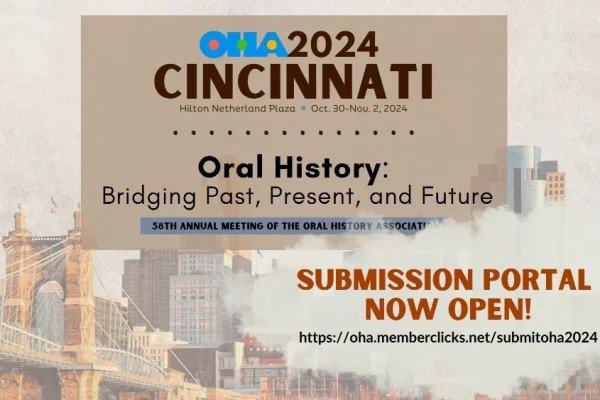Between now and February 23, submit your proposals for a panel, listening session, roundtable, hands-on session, individual paper, poster, pre-conference workshop, or other session for OHA’s 2024 Annual Meeting through our online portal!
Before you do that, you can check out the 2024 Call for Proposals, Submission Guidelines, and General Conference Information.
Inspired by past, present and future oral historians and oral history projects, the 2024 Oral History Association Annual Meeting looks to reflect not just on oral history work throughout its nearly 70 year history, but also to explore how that work has had an impact on the work we do today and how the work we do today will influence and benefit practitioners and communities of the future. Accordingly, we invite you to consider the following questions as examples of the ideas and discussions we hope to include in the 2024 program:
Past: What projects, interviews, or practitioners inspired your professional path or your project aims? What oral history standards and practices have changed over the decades, and how has that had an impact on your work? What history or stories of the past were not recorded, and what can be done to fill in that historical gap?
Present: What’s the current technology you’re working with? What oral history-related questions are you grappling with today? What current events, individuals or communities are informing and inspiring your oral history practice; how have recent events, such as the pandemic or climate change, shaped or inspired your oral history practice? Does your work reshape, or recenter, oral history practice to better align with social justice efforts?
Future: What do you hope for the future of your collection or your project; what are the imagined or expected future uses for the interviews you’ve conducted? What advice would you give to future (and current new) oral history practitioners? How do you hope or expect the practice of oral history (or OHA) to change in the future? Is there a speculative nature to your current project or the interviews you’ve conducted; asking narrators or communities to look ahead and imagine the future they want or expect to see?
More information here!

